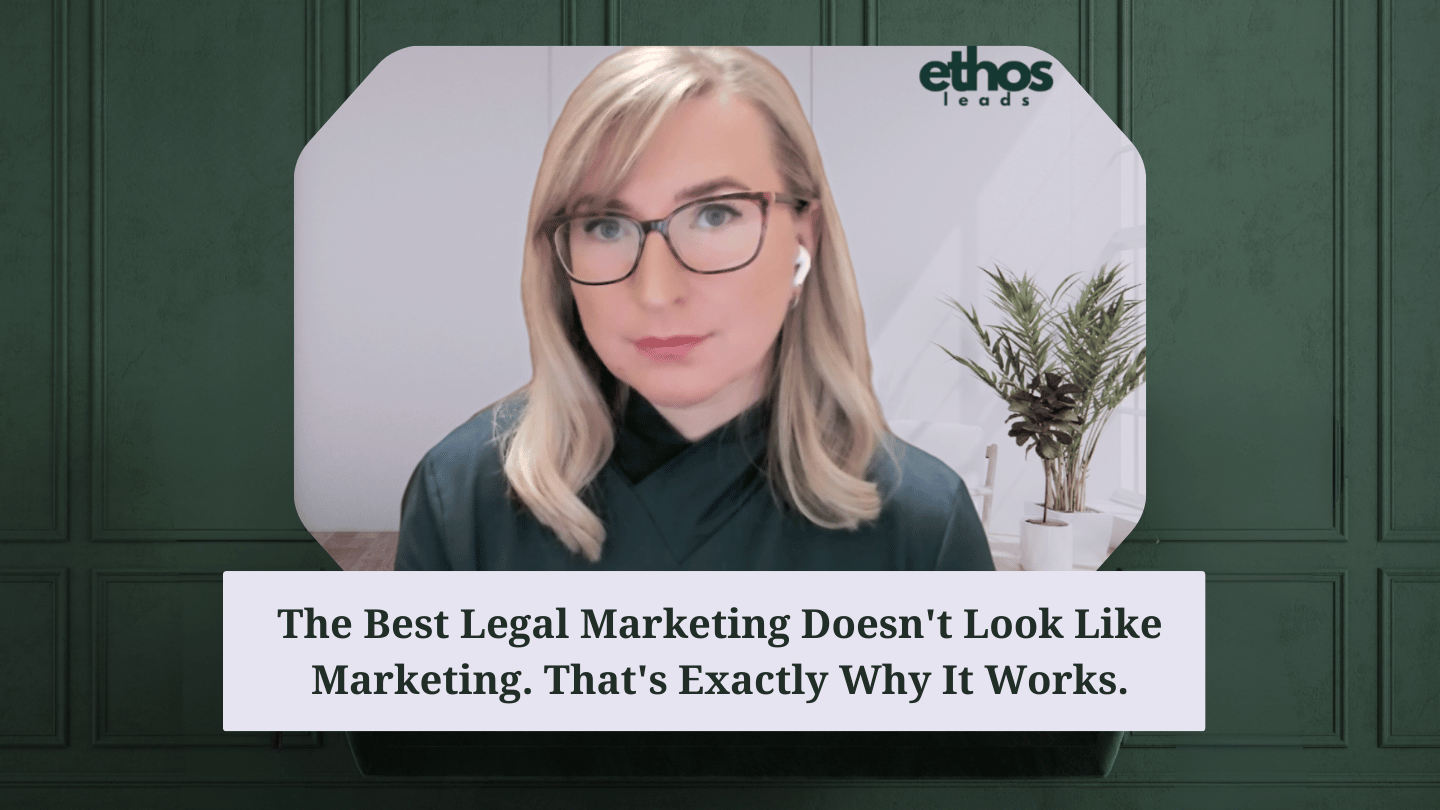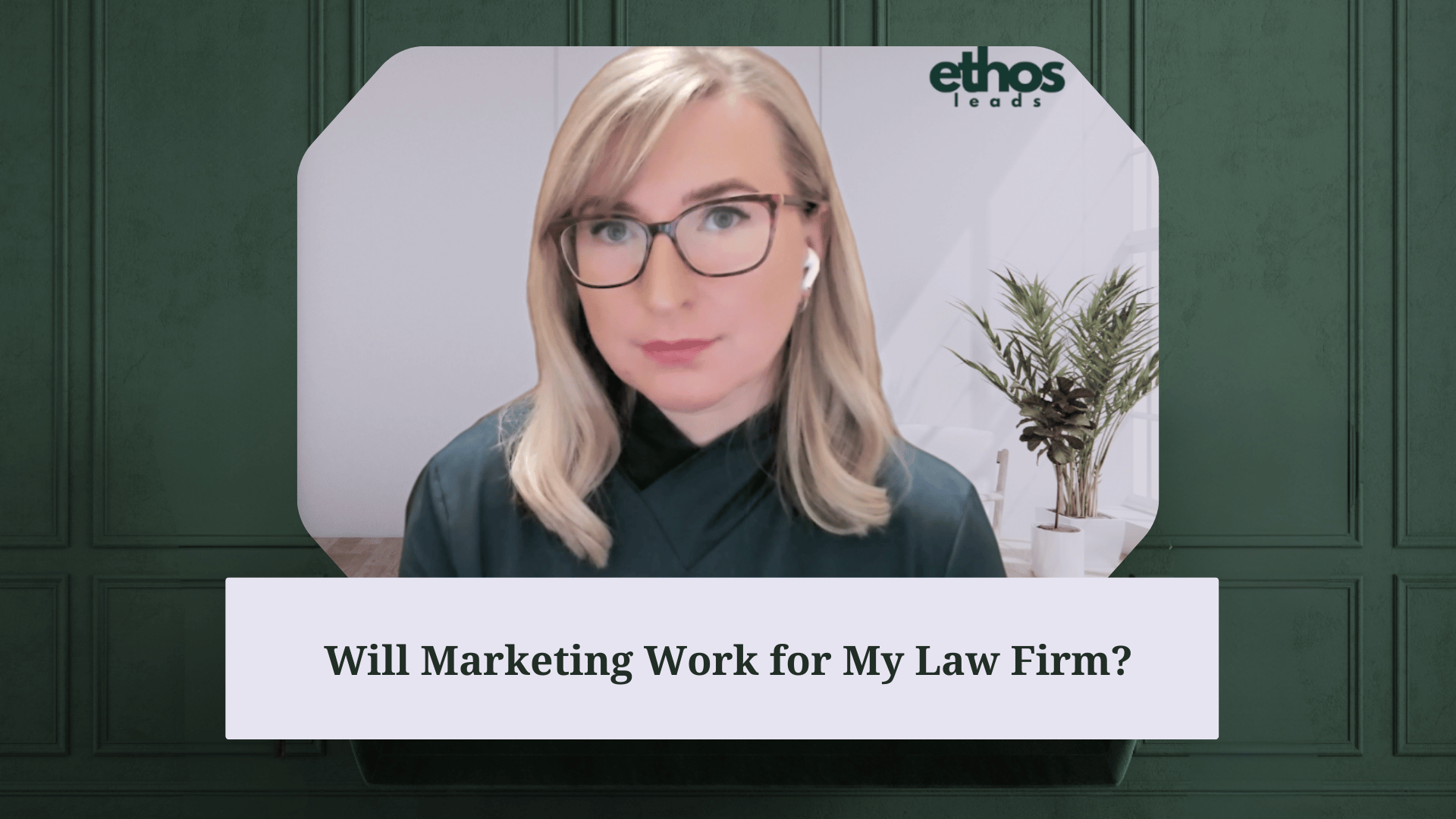Paid Advertising Strategies for Informational Intent: Capture Clients Seeking Legal Information
- Ads
- 16 mins
Understanding Informational Intent
Paid advertising can be an effective way to reach potential clients actively seeking legal information and services. By understanding their informational intent and creating targeted campaigns, lawyers and law firms can establish themselves as trusted resources and capture the attention of individuals at the critical stage of informational intent.
What if you could reach potential clients before they even know they need a lawyer? That's the power of understanding informational intent.
Informational intent refers to the mindset of individuals who are actively seeking information or knowledge about a specific topic or service.
In the legal context, this could involve people researching legal issues, looking for information on specific practice areas, or trying to understand their rights and options regarding a legal matter.
Capitalizing on informational intent allows lawyers and law firms to establish themselves as credible sources of legal knowledge, even before potential clients are ready to make a hiring decision.
Targeting users with informational intent offers several advantages:
1) Reach Clients Early in the Decision-Making Process
By appearing in search results or social media feeds when people are actively seeking legal guidance, lawyers can reach potential clients at the beginning of their decision-making process. This early exposure can shape the client's perception of the firm and increase the likelihood of being considered when they are ready to engage legal services.
Imagine someone searching for "What to do after a car accident." By appearing at the top of their search results with an informative blog post or video, you position yourself as a helpful resource and build trust early on. This trust can translate into a client relationship when they require legal representation down the line.
2) Generate Qualified Leads
People with informational intent are actively researching legal issues, indicating a genuine interest in potentially needing legal services.
By addressing informational needs early on, lawyers can guide prospects through the decision-making process, ultimately leading to increased client acquisition.
3) Build Trust and Establish Thought Leadership
Focusing on informative content positions your law firm as a trusted advisor, not just another advertiser. This approach fosters credibility and establishes you as a thought leader in your practice area, leading to organic visibility and attracting clients through word-of-mouth recommendations.
Here are some everyday informational search queries you might target with your paid advertising campaigns:
- "Do I need a lawyer for a minor car accident?"
- "What are my rights as a tenant?"
- "How to file for bankruptcy?"
By using relevant keywords and crafting compelling ad copy, you can ensure your firm appears in front of the right audience at the right time.
Tips for Effective Awareness Stage Ads
- Value Proposition: Clearly state the benefit, such as "Free Guide," "Download Now," or "Learn More."
- Visuals: Use professional images related to law and justice to capture attention.
- Call to Action (CTA): Encourage users to take the next step (e.g., "Download Now," "Get Your Guide").
- Relevance: Ensure the ad copy and visuals are directly related to the user's search intent.
- Trust Signals: Where space allows, include subtle credibility signals like "Trusted since 1995," "Over 20 Years of Experience," "Helped 10,000 Clients" etc.
These ads should be linked to landing pages that offer the promised informational resources, along with options for users to learn more about your services if they wish to proceed further. This strategy helps build trust and positions your firm as a helpful, knowledgeable resource in the eyes of potential clients. Learn more about How to Create High-Converting Landing Pages for Paid Ads.
Below are Google Ad, LinkedIn Ad, and Meta Ad strategies for lawyers targeting users with informational intent.
Google Ads for Lawyers: Awareness Stage (Informational Intent)
At the awareness stage, potential clients are seeking general information and guidance about a legal issue or concern.
Here's a list of Google Ads options lawyers can leverage at the awareness stage, where the focus is on educating potential clients and establishing yourself as a trusted resource:
Search Ads (Text Ads):
- Target Broad Informational Keywords: Focus on keywords like "[Practice Area] Lawyer Near Me," "[Legal Issue] FAQs," or "What to Do After a [Incident]."
- Ad Copy: Highlight your expertise and availability. Example: "Free Consultation with Experienced [Practice Area] Lawyer."
- Landing Page: Direct users to informative landing pages with blog posts, FAQs, or downloadable guides addressing their concerns.
Display Ads (Banner Ads):
- Target Relevant Websites & Blogs: Target legal news websites, blogs in your practice area, or local community websites.
- Ad Creatives: Use visually appealing banners with clear messaging. Example: "Facing a [Legal Issue]? Get Informed Now. Download Our Free Guide."
- Landing Page: Lead users to informative landing pages with downloadable resources or website sections that answer common questions.
Responsive Display Ads:
- Create responsive display ads that automatically adjust to fit various ad placements and screen sizes.
- Highlight your firm's expertise and offer free resources like legal guides or checklists.
- Include calls-to-action that encourage users to download the resource or learn more.
YouTube Ads (In-Stream & Discovery Ads):
- Create Educational Video Content: Develop short videos addressing common legal concerns or offering legal tips. If you need ideas, read 10 Video Ideas for Lawyers to Promote Their Legal Practice.
- Target Relevant YouTube Channels & Topics: Target channels related to legal topics or local news channels.
- Landing Page: Direct viewers to informative landing pages with more detailed information or consultations with your firm.
Discovery Ads:
- Showcase Expertise & Client Success Stories: Use visually engaging cards showcasing your practice areas, client testimonials, or awards.
- Target Audience Interests: Target users interested in legal topics, your practice area, or local legal news.
- Landing Page: Direct users to informative landing pages about your firm, specific practice areas, or client testimonials.
Remarketing Ads (Display & Search):
- Recapture Website Visitors: Retarget users who visited your website but haven't converted yet.
- Ad Creatives: Use dynamic remarketing ads showcasing content relevant to their previous browsing behavior.
- Landing Page: Direct users back to informative content related to their initial search or offer a downloadable resource to capture leads.
Additional Tips:
- Highlight Free Consultations: Showcase the opportunity for a free consultation to encourage initial contact.
- Location Targeting: Target geographically relevant searches to attract local clients.
- Call Extensions: Include call extensions in your ads to encourage immediate contact.
By using these Google Ads formats and targeting informational keywords and user intent, you can effectively reach potential clients in the awareness stage, provide valuable legal information, and position your firm as a trusted authority in your practice areas.
Read more about Google Ads for Lawyers.
LinkedIn Ads for Lawyers: Awareness Stage (Informational Intent)
At the awareness stage, the goal is to inform and educate potential clients about your legal services and expertise. Here are some LinkedIn ad types that can be effectively used by lawyers to achieve this:
1. Sponsored Content:
- Share Valuable Industry Insights: Publish informative articles, blog posts, or white papers addressing common legal issues relevant to your practice area.
- Target by Industry & Job Title: Target professionals in industries where your legal expertise is applicable or decision-makers who might require legal services (e.g., CEOs, CFOs).
- Benefit: Educate potential clients and showcase your knowledge while establishing yourself as a trusted resource.
- Ad Types:
a) Single Image Ads: Share an engaging post with an informative image related to legal tips, industry news, or a specific area of law.
Example: "Top 5 Legal Tips for Small Business Owners"
b) Video Ads: Use short, informative videos to explain legal concepts, share success stories, or introduce your law firm.
Example: "Understanding Your Rights in Personal Injury Cases"
c) Carousel Ads: Use multiple images/cards to tell a story or present a series of legal tips or case studies.
Example: "Steps to Protect Your Intellectual Property"
d) Event Ads: Promote upcoming webinars or live events to educate your audience on legal topics.
Example: "Join Our Free Webinar on Employment Law Essentials"
2. Sponsored InMail:
- Write Thought Leadership Introductions: Develop targeted messaging introducing yourself and your unique perspective on legal issues impacting the industry.
- Target by Title & Company: Target specific decision-makers within companies or professionals with relevant job titles who might benefit from your services.
- Benefit: Allows for a more personalized approach to connect with potential clients directly and position yourself as a thought leader.
- Ad Types:
Informative InMail: Send a personalized message offering a free downloadable guide, eBook, or access to a webinar.
Example: "Download Our Free Guide: 'Navigating Family Law Disputes"
3. Thought Leader Ads:
- Feature Industry Expertise: Create content specifically designed to showcase your thought leadership on relevant legal topics.
- Target by Demographics & Interests: Target users based on relevant demographics, industry, or interests related to your area of expertise.
- Benefit: Establish yourself as a leading authority in your practice area and attract potential clients seeking insights from respected professionals.
4. Dynamic Ads:
- Leverage User Profiles & Engagement: Personalize ad content based on a user's profile information, past engagement with your content, and industry trends.
- Target by Demographics & Interests: Target users based on relevant demographics like location, industry, or interests related to legal topics.
- Benefit: Increase ad relevance and engagement by tailoring content to user profiles, interests, and current industry issues.
- Ad Types:
a) Follower Ads: Encourage LinkedIn users to follow your law firm's LinkedIn page to stay updated with legal insights and news.
Example: "Stay Informed on Legal Matters – Follow Us!"
b) Content Ads: Showcase content or promote a free resource, such as a legal guide or whitepaper.
Example: "Download Our Free eBook on Estate Planning Today"
5. Text Ads:
- Target Informational Keyword Searches: Focus on keywords related to legal issues or informative content your firm offers (e.g., "contract negotiation tips").
- Headline & Description: Craft compelling headlines and ad copy that pique user interest and highlight your unique insights.
- Benefit: Capture users actively searching for legal information on LinkedIn.
- Ad Types:
Awareness Text Ad: Highlight your expertise with a compelling call to action that encourages users to learn more.
Example: "Need Legal Insights? Read Our Latest Blog on Corporate Law"
Additional Tips:
- Show Expertise Through Content: Include links to informative blog posts, articles, or videos you've created to demonstrate your knowledge and unique perspective.
- Include Strong Calls to Action: Encourage users to connect with you, download resources, or visit your website for further information.
- Track & Analyze Results: Monitor the performance of your LinkedIn Ad campaigns and adjust your strategies based on data and engagement metrics.
By implementing these LinkedIn Ad strategies, you can effectively target legal professionals and potential clients seeking legal information at the awareness stage. This will help you build brand awareness, establish yourself as a thought leader in your practice area, and nurture potential clients towards your firm for future legal needs.
Learn more about LinkedIn Ads for Law Firms.
Meta Ads for Lawyers: Awareness Stage (Informational Intent)
At the awareness stage, the goal is to introduce your law firm to potential clients and provide valuable information that can help them recognize a need for your services. The focus is on building brand recognition and establishing your firm as a trusted source of legal information.
Below are Meta (Facebook and Instagram) ad types that can effectively raise awareness for lawyers.
1. Image Ads
- Objective: Share informative content and establish brand presence with eye-catching images.
- Ad Types:
Single Image Ads: Use high-quality images to share tips, facts, or introduce your firm.
Example: "Top 5 Tips for Choosing the Right Lawyer"
2. Video Ads
- Create educational videos explaining common legal concepts, answering frequently asked questions, or addressing common legal concerns.
- Promote these videos through Facebook and Instagram's Video Ads, targeting relevant audiences based on interests, demographics, and behaviors.
- Include clear calls-to-action encouraging users to visit your website or download additional resources for more information.
- Objective: Provide valuable information and engage potential clients with dynamic video content.
- Ad Types:
Informational Videos: Create short videos offering legal tips, introducing your team, or explaining legal concepts.
Example: "Understanding Your Rights in Personal Injury Cases"
3. Carousel Ads
- Develop a series of visually compelling carousel cards, each addressing a different legal topic or concern.
- Use attention-grabbing headlines and visuals to pique interest and position your firm as a knowledgeable authority.
- Include links directing users to educational blog posts, guides, or FAQs on your website.
- Objective: Highlight multiple aspects of your firm or different pieces of valuable information.
- Ad Types:
Educational Carousel: Use a series of images or videos to explain a legal process, introduce team members, or share client success stories.
Example: "Step-by-Step Guide to Filing a Claim"
4. Slideshow Ads
- Objective: Combine images, text, and sound to create an engaging, informative slideshow.
- Ad Types:
Educational Slideshows: Use slideshows to present a series of tips or important information about legal topics.
Example: "What to Do After a Car Accident – 5 Essential Steps"
5. Collection Ads
- Showcase a collection of educational content, such as blog posts, videos, or guides, addressing common legal concerns.
- Use compelling visuals and headlines to capture users' attention and position your firm as a valuable resource.
- Include clear calls-to-action encouraging users to explore your educational content and learn more.
- Objective: Allow users to explore multiple pieces of content in a single ad unit.
- Ad Types:
Informative Collection: Present articles, videos, and images related to your legal services and expertise.
Example: "Learn About Our Services – From Personal Injury to Family Law"
6. Instant Experience (Canvas) Ads
- Objective: Provide an immersive, full-screen experience with a combination of images, videos, and text.
- Ad Types:
Educational Experience: Create an engaging, interactive experience that educates potential clients about legal topics and your firm.
Example: "Your Guide to Understanding Employment Law"
7. Stories Ads
- Objective: Use vertical full-screen ads to capture attention and share quick, informative content.
- Ad Types:
Short Tips or FAQs: Share brief, impactful tips or answers to common legal questions in story format.
Example: "3 Things to Know About Divorce Law"
8. Lead Ads
- Offer valuable legal resources or information (e.g., guides, checklists, whitepapers) in exchange for user information through Meta's Lead Ads.
- Highlight the benefits and value of the resource you're offering to encourage users to provide their contact details.
- Leverage Meta's targeting capabilities to reach potential clients based on interests, demographics, and behaviors.
- Objective: Collect contact information from interested users by offering valuable content.
- Ad Types:
E-book or Guide Download: Offer a free downloadable guide or e-book in exchange for contact information.
Example: "Download Our Free Guide to Understanding Personal Injury Claims"
These Meta ad types and examples are designed to build brand awareness and provide valuable information to potential clients at the awareness stage, positioning your law firm as a trusted and knowledgeable resource.
Additional Tips:
- Highlight Free Consultations: Showcase the opportunity for a free consultation to encourage initial contact.
- Location Targeting: Target geographically relevant locations to attract local clients.
- Track & Analyze Results: Monitor the performance of your Meta Ad campaigns and adjust your strategies based on data and engagement metrics.
By implementing these Meta Ad strategies, you can effectively reach potential clients in the awareness stage on Facebook and Instagram. This will help build brand awareness, establish yourself as a trusted resource, and nurture potential clients towards your firm for future legal needs.
Ethical Considerations and Best Practices: Building Trust Wins Every Time
While paid advertising can be a powerful tool for legal professionals, it is important to adhere to ethical standards and legal advertising regulations. Transparency and truthfulness in advertising are very important, as any deceptive or misleading practices can damage a firm's reputation and credibility. Lawyers must ensure that their advertising complies with relevant state bar association rules and guidelines.
In addition to ethical compliance, successful paid advertising campaigns for informational intent should focus on building trust and likeability through authentic and helpful content.
Rather than using aggressive sales tactics or making exaggerated claims, lawyers and law firms should strive to provide genuine value and establish themselves as trustworthy sources of legal information. Offer free consultations, informative webinars, or downloadable guides packed with valuable legal insights.
This approach not only aligns with ethical principles but also resonates with potential clients who are seeking reliable guidance.
By consistently delivering valuable and informative content through paid advertising campaigns, lawyers and law firms can establish themselves as thought leaders and industry experts in their respective practice areas. This not only enhances their credibility and reputation but also increases the likelihood of being top-of-mind when potential clients are ready to seek legal representation.
Conclusion
Paid advertising strategies tailored to informational intent present a powerful opportunity for lawyers and law firms to reach potential clients at a critical stage in their decision-making process. By appearing in search results and social media feeds when individuals are actively seeking legal information, legal professionals can establish themselves as authoritative and trustworthy resources.
However, it is essential to approach paid advertising campaigns with ethical considerations in mind, adhering to legal advertising regulations, building trust through authentic and helpful content, and focusing on establishing long-term thought leadership and industry expertise.
By leveraging the principles of informational intent and ethical paid advertising practices, lawyers and law firms can effectively attract and engage potential clients, ultimately driving business growth and success.
Related articles:
Paid Advertising for Lawyers: Reaching Clients at Every Stage of Their Legal Journey
Paid Advertising Strategies for Commercial Investigation Intent: Capture Clients Considering Legal Solutions
Paid Advertising Strategies for Transactional Intent: Capture Legal Leads Ready to Convert




